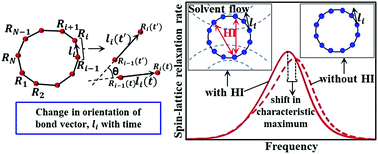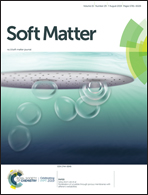Orientational relaxation of ring polymers in dilute solutions
Abstract
The segmental relaxation dynamics of ring polymers in dilute solutions is investigated via optimized Rouse–Zimm theory. To the best of our knowledge, this is the first study that characterizes the orientational relaxation dynamics of ring polymers in dilute solutions. The orientational time autocorrelation functions are governed by two major processes that span a broad range of timescales: (i) local segmental motion at short times, independent of the ring size, and (ii) overall motion of the ring at long times that depends on the limiting ring size. Smaller rings relax faster than larger rings and their respective linear analogues. The hydrodynamic interactions decrease the higher relaxation rates corresponding to the local relaxation modes and increase the smaller relaxation rates which correspond to the collective relaxation modes. The spectral density is independent of frequency in the low frequency regime while it decreases with increasing frequency. Regardless of the ring size, the spin–lattice relaxation rate exhibits a single characteristic maximum as a function of frequency that shifts to a lower value with increasing strength of hydrodynamic interactions.



 Please wait while we load your content...
Please wait while we load your content...